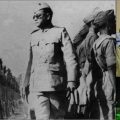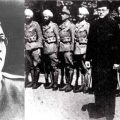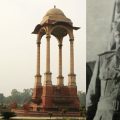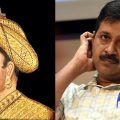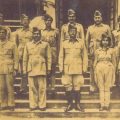On Renaming Andaman, ‘Netaji Bose a Radical Hindu Nationalist’: The Telegraph
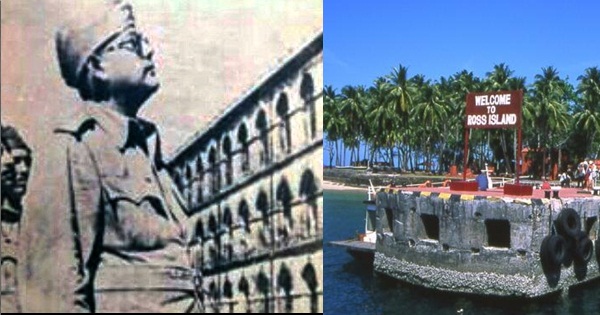
On 30th December 2018 on the occasion of the 75th anniversary of the hoisting of the Tricolour by Netaji Subhash Chandra Bose, PM Modi addressed a public meeting at Netaji Stadium in Port Blair, Andaman and Nicobar Islands. Donning the Azad Hind Fauj cap, he spoke about Netaji’s role in the freedom struggle. At this meeting, as a tribute to Netaji Bose, PM Modi announced the renaming of three islands of Andaman and Nicobar. Ross Island was renamed as Netaji Subhash Chandra Bose Dweep, Havelock Island as Swaraj Dweep, and Neil Island as Shaheed Dweep. It was on December 30, 1943 that Netaji Bose first suggested that Andaman and Nicobar Islands be renamed as Shahid and Swaraj Dweep respectively.
Besides, Modi also released a commemorative stamp and a Rs 75 coin on the occasion. He further announced the setting up of a deemed university in the name of Netaji Bose.
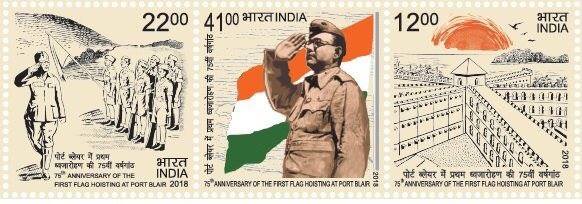
Commemorative postal stamps marking the 75th anniversary of the first flag hoisting at Port Blair by Netaji; Courtesy: Anuj Dhar
After the announcement, there were mixed reactions from the public, media, and the polity. Scroll reacted with an article with the headline – ‘As Andaman islands are renamed after Bose, a reminder: Netaji was intensely disliked by locals’. An Indian Express report carried this news – “The social media is flooded with adverse reactions, mainly because the remote Islands are facing problems of connectivity and transportation. According to them, it’s more important than ‘names’….Those associated with the tourism business said that they had invested money in creating a brand name for ‘Havelock Island’ and ‘Neil Island’”.
The Telegraph carried the following headlines – “Indian PM strips islands of British colonial names – and renames them after freedom fighter”. This article by Rahul Bedi starts thus – “India’s Prime Minister Narendra Modi has rechristened three of the country’s island territories named after colonial officials, as part of a campaign by his Hindu nationalist government to disassociate itself from two centuries of British rule.” Mark the phrases used here – ‘his Hindu nationalist government’ and ‘disassociate itself from two centuries of British rule’. Does Bedi hate the very idea of getting disassociated with British rule?
Rahul Bedi continues thus, “Mr Bose, who was a radical Hindu nationalist, had raised a rebel army of Indian soldiers during WWII with the help of Nazi Germany and Imperial Japan, to fight the British.” Bedi mentions ‘rebel army of Indian soldiers’. ‘Rebel’ because they fought against the British Crown? ‘Rebel’ because they allied with the enemy of the British to fight for India’s freedom? In this regard Maj Gen GD Bakshi had said, “The Azad hind Govt had been duly established by Law – had been recognised by 11 Countries and had declared war on great Britain. The soldiers of INA had sworn an Oath to Azad Hind govt and their own country. That oath superseded his oath to an illegal colonial govt.”
“Are you telling me that all our Officers who had taken the oath to the British were still required to be loyal to the British even after 1947? Why were the Japanese the enemy? They were helping us get freedom. My enemy’s enemy is my friend is Chanakya Niti. Before you show such great loyalty to the Brtish please read how they callously and deliberately let 4 Million Indians starve to death in Bengal while grain was shipped to their Soldiers. That amounted to Genocide and it wasn’t the only famine in British india. You still want to bootlick the Brits as many of our predecessors did – that’s your choice. But please immigrate to Britain before you do that. Not on Indian Soil please – we have surfeit of traitors.”
In The Telegraph article, Bedi indirectly glorifies the British officers under whose names the islands had been named and how Modi renamed these in the memory of freedom fighters.
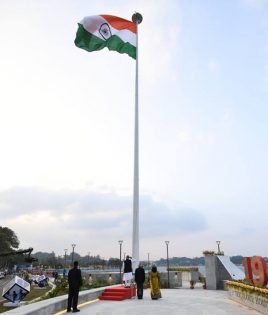
PM Narendra Modi unfurling the National Flag in Port Blair to mark the 75th anniversary of hoisting the Tricolour on Indian soil by Netaji Subhas Chandra Bose.
Thanks to the History we are taught in schools. History doesn’t glorify Netaji Bose. Likewise the struggles and sacrifices of thousands of freedom fighters don’t find a mention in these books.
In 1940, at the age of 43, Netaji Bose escaped from India. Why? To seek help from Indians settled and working overseas to drive the British out of India. To arrange an army with the help of Japan and other countries to attack the British forces in the Indian soil and free India. He was confident about it. And he succeeded! Netaji Bose established the Provisional Government of Free India, i.e. Azad Hind Govt. in Singapore on 21 October 1943. Its army was the Azad Hind Fauj. He allied with the Axis powers and his cause was funded by Imperial Japan monetarily, militarily and politically. It was recognized by 11 countries including Russia.
At a rally of Indians in Burma in 1944, Netaji Bose said, “….Today I demand of you one thing, above all. I demand of you blood. It is blood alone that can avenge the blood that the enemy has split. It is blood alone that can pay the price of freedom. Give me blood and I promise you freedom.” Many Indians donated for the cause. It mattered not which countries supported for Netaji’s cause. What mattered was Netaji’s aura in foreign lands, his persona, his determination, his spirit that led foreign nations lend their support for the freedom of India.
Only a daring and brave son of Bharat Mata could undertake such death-defying journeys, moving from one country to another, until he could find a safe haven where he could gather forces to wage war against British. It was only Netaji Bose who could motivate Indians settled abroad, organize a force of 60,000 soldiers, and collect funds for the cause.
With Japan’s support, the Provisional Government of Free India had nominal authority of the Andaman and Nicobar Islands including parts of Manipur and Nagaland. And Azad Hind declared war against the Anglo-American allied forces on the Indo-Burma Front. They charged against the British forces in the Imphal-Kohima sector. After defeating the British defences in Kohima, they advanced further towards Moirang. From here they had to retreat owing to compromised supply lines and withdrawal of Japanese forces.
Few Indians are of the opinion that Netaji Bose garnered support of Germany and Japan, members of the Axis powers in World War 2. One of the allied powers was Britain along with British India (given the fact that the Congress and Muslim League gave their consent on India as belligerent and at war). Is it because Netaji and his INA men supported the enemy of British, against the British crown that they were considered deserters and oath breakers?
Our history books is all full of praise for Mahatma Gandhi, crediting him for India’s freedom. In the words of Maj Gen GD Bakshi, “A succession of court historians have tried to craft a narrative that India had obtained her freedom entirely by the soft power of ahimsa (non-violence) and Satyagraha; and that hard power had no role to play whatsoever. This is a huge sacrilege. As per the INA’s official history, the force had a total strength of 60,000. Of these, 26,000 were killed in action. Was that non-violence? The pity is that the Nehruvian dispensation treated these men as traitors. There is no memorial for the 26,000 martyrs. The INA veterans were not taken back into the Army (on Mountbatten’s advice) and denied their war time pensions. Any nation that seeks to gloss over the martyrdom of 26,000 of its soldiers erodes the very basis of its nationhood.”
To quote Maj Gen GD Bakshi further, “A great deal of British archival material is now available that clearly proves that the British left primarily because of the outrage in India caused by the INA trials and the British fear that widespread revolts would start in the Indian armed forces. The most primary source was Lord Clement Attlee, the British PM who signed the independence of India Act in 1947. In 1956, he clearly said to Justice PB Chaktrabarthy that the British had left solely because of the INA of Netaji Bose and the role of Mahatma Gandhi in their decision to leave was minimal.”
If correct history is taught, such confusion and mixed reactions on renaming of Andaman and Nicobar Islands after Netaji Bose and freedom fighters would hardly have arisen.
Featured image courtesy: Google and India Today.

